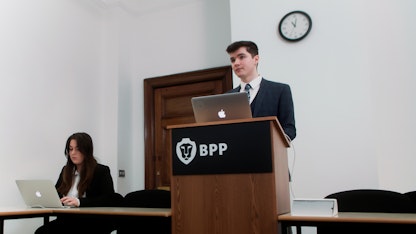How to become a barrister: advice from a BTC tutor

The journey to becoming a qualified barrister is full of challenges. To make things easier, experienced barrister and our expert tutor Claire Robey shares her top tips and advice for aspiring barristers.
The journey to becoming a qualified barrister is full of challenges. To make things easier, experienced barrister and our expert tutor Claire Robey shares her top tips and advice for aspiring barristers. If you’re wondering how to qualify as a barrister, this is the article for you.

Claire was called to the Bar in 2006, and her exciting and varied career in commercial law had her practising across London, the British Virgin Isles, and Hong Kong. Since 2017, Claire has been a passionate tutor on the Barrister Training Course (BTC) at BPP Bristol.
Read on as Claire shares her insights for aspiring barristers.
What is the Barrister Training Course (BTC)?
How can you best prepare to start your course?
Firstly, you can brush up on your undergraduate or law conversion course notes on basic contract, tort, and crime.
Secondly, start to change your mentality from academic to practical: thinking about things in terms of what a client wants and how to achieve their aims, rather than just what is legally interesting.
What can students do if they’re struggling or worried about falling behind?
If you’re struggling, or have any worries, there are so many avenues of support. We’re extremely understanding about how demanding the BTC is. You can speak to your subject tutors, your personal tutor, your student class rep, the learning support team, or the safeguarding team.
Our support network will work with you to put in place a learning and exam plan which works for you, and they’ll make sure you feel supported on the mental health front as well.
What opportunities are available for aspiring barristers to develop at BPP?
The BTC is a challenging course but there is time to take advantage of the wide range of development opportunities. I’d encourage everyone to take part in pro bono work with BPP’s Social Impact team, as it puts the material you’ve learnt into context, as well as being ethically important to make pro bono a part of your professional life from day one.
What is the most exciting part of starting a legal career?
Starting a legal career is incredibly exciting because of all the possibilities it offers. In the beginning, you’ll work out which areas of law interest you most and start to see the practical application of your academic legal knowledge.
The prospect of a first real court appearance is also really exciting, if nerve-wracking!
What advice would you give yourself at the start of your career?
Looking back, I wish someone had told me to put my ego to one side and to accept constructive criticism more readily. Once in practice, you’re self-employed so you need to pro-actively create your own opportunities to keep developing. Any chance to learn from someone senior – or junior – is valuable. Make the most of it.
Looking for application advice? Speak to a personal advisor!
What qualities and values do you think the best lawyers exhibit?
Strong ethics and a sense of justice
An ability to understand people
Forensic attention to detail
The capacity to handle large volumes of information
A love of the law
A quiet confidence and humility
Learn more about lawyer skills
What advice would you give to students to help them stand out when applying for mini-pupillages and pupillage?
Make sure you gain practical legal experience. Any kind of experience in handling your own cases, especially in court or before a tribunal, is great.
When describing mini-pupillages or work experience, don’t just list cases that you saw, as that tells the panel nothing about you. Instead, focus on what skills you developed during the mini-pupillage which will make you a better pupil, e.g. learning to conduct a conference with a difficult client.
In interviews, try to work out why the panel are asking a particular question and use every answer to demonstrate why you would make the ideal pupil. For example, when an interviewer asks what motivates you to be a barrister, what they really want to know is whether you have a realistic idea of life at the bar. They want to work out whether you have strong, sound motivation to handle the challenges of that lifestyle, whilst still enjoying it.
Final thoughts
Becoming a barrister offers a varied and rewarding career path. If you’re looking to qualify as a barrister, the BTC is a practice-focused course taught by experienced barristers and judges.
You’ll have the chance to hone your barrister skills with small classes for Advocacy and Conference, and learn in an environment that simulates a barrister’s chambers.
Become a barrister with the BTC


